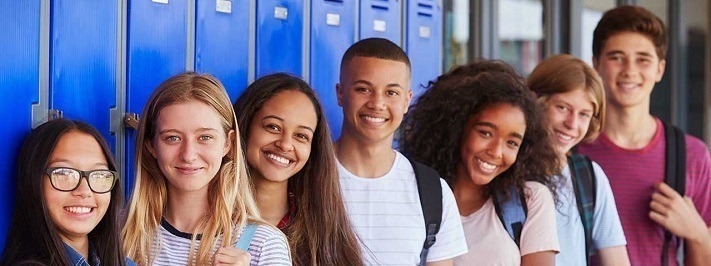Study: A combined teaching + app gratitude program helps adolescents address anxiety and improve mental health
 Students and educators have started a new school year in the midst of a pandemic, an economic crisis, a reckoning with racial injustice, and a divisive political climate. Everyone’s mental health is at risk, and schools are searching for ways to support young people’s well-being in addition to their academic learning.
Students and educators have started a new school year in the midst of a pandemic, an economic crisis, a reckoning with racial injustice, and a divisive political climate. Everyone’s mental health is at risk, and schools are searching for ways to support young people’s well-being in addition to their academic learning.
In recent years, many educators have done this with social-emotional learning (SEL) programs, which focus on building students’ skills in understanding and managing emotions, relating positively with others, and behaving in personally and socially responsible ways. Now, a new study suggests that an area of SEL that has often been overlooked in the past could be key to building community and resilience in students: gratitude.
In a study published in The Journal of Positive Psychology, Giacomo Bono and his colleagues found that when high schoolers are taught about gratitude and given opportunities to practice it, they show improved mental health and wellness. Based on these findings, the authors argue that incorporating gratitude can be a relatively easy, low-cost strategy to help students thrive.
Across two urban high schools, six classrooms (152 students) participated in lessons and activities to learn about the science of gratitude—what it means, how to practice it, and the benefits it can bring—for six weeks. Additionally, students were given access to a gratitude web app called GiveThx that functioned somewhat like a private social media network. The app allowed students to express thanks to their classmates and teachers in a low-pressure, authentic way, whenever and however they chose. The hope was that this combination would be engaging for students and make expressing and receiving gratitude a natural and rewarding part of their school experience.
A control group of nine comparable classrooms (175 students) did not receive the gratitude program. Six more classrooms, 82 students total, used the app only during the same period. At the beginning and end of the six weeks, all the students filled out well-being surveys.
What the researchers found was striking. After six weeks, compared with the control group, students who received the full program not only reported a stronger sense of gratitude—they also reported increased positive emotions, decreased anxiety and negative emotions, and greater satisfaction with both their friendships and their lives overall. In other words, learning about and practicing gratitude seemed to significantly improve these high schoolers’ social and emotional well-being.
Further analyses showed that students who received both components of the program gave thanks more often, more intensely, and to more people compared to students who only used the app, indicating the value of including classroom lessons, as well.
Lastly, sharing gratitude seemed to be key; the more students said they expressed thanks to others, the more they showed improvements in a range of SEL competencies, including emotion regulation, motivation to achieve, kind and helpful behavior, teacher and peer relationships, and sense of meaning in life.
Altogether, this study provides compelling evidence that teaching high schoolers about gratitude and encouraging them to practice and express it—on their own terms, in ways they are comfortable with (like on social media)—can help them become happier and improve their mental health.
This study remedied some of the shortcomings of previous studies in the field by designing an entirely new gratitude program specifically for high school students, that was taught by teachers, and incorporated technology, giving teens lots of freedom in how to express themselves. Many previous gratitude programs were not tailored to adolescents in these ways, and thus may not have felt particularly motivating or meaningful to young people. Additionally, though research has shown that actually expressing gratitude to others (beyond simply feeling it oneself) can be extra impactful, few youth gratitude programs have included this step—or grappled with how awkward it might feel for teens to express thanks.
Though this study was conducted pre-COVID-19 and did not involve distance learning, it is easy to imagine how, even (or especially) when students are not together in person, making a habit of expressing thanks could help build community and well-being. Since gratitude can also help diminish negative emotions, it could be especially valuable in these times of fear and uncertainty.
In fact, another recent study in China found that part of the reason why grateful teens tend to be less anxious and depressed is because they have greater coping flexibility—a stronger ability to think of and use different coping strategies to fit whatever problems they face. It is difficult to imagine a more opportune time than now for youth to develop flexible coping and emotional resilience.
When it feels like the world is crashing down around them, giving young people a moment to feel, express, and receive gratitude can help—and that in itself is something to be grateful for.
 – Emily J. Campbell, Ph.D., holds a doctorate in Human Development and Education at the UC Berkeley Graduate School of Education, and worked as a research associate at the Greater Good Science Center. Based at UC-Berkeley, Greater Good highlights ground breaking scientific research into the roots of compassion and altruism. Copyright Greater Good.
– Emily J. Campbell, Ph.D., holds a doctorate in Human Development and Education at the UC Berkeley Graduate School of Education, and worked as a research associate at the Greater Good Science Center. Based at UC-Berkeley, Greater Good highlights ground breaking scientific research into the roots of compassion and altruism. Copyright Greater Good.
To Learn More:
- Study shows how practicing gratitude can help train your brain and improve mental health over time
- Six tips to build resilience and prevent brain-damaging stress
- Enhance Happiness and Health by Cultivating Gratitude: Interview with Robert Emmons
- Neuroscience tips about gratitude, aging, pain and the brain: An interview with Dr. Daniel Levitin


